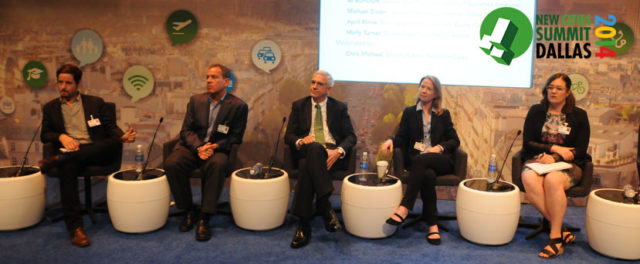The Shared City
October 3, 2014 — Blog
This post is part of our Re-imagining Cities discussion series, following the third edition of the NewCities Summit in Dallas in June 2014.
This session discussed the emergence of the sharing economy and its relationship to urban environments. The speakers examined how a growing number of technological platforms geared at sharing resources efficiently may offer the sharing city both economic and social benefits. Panelists also explored the future growth of the sharing model, including both new opportunities and potential challenges for cities.

Molly Turner argued that cities are the original sharing platforms, collectively organizing resources and infrastructure in an effective manner. New technologies, she argued, are compelling people to re-learn what it means to live in a sharing city. According to Turner, cities can reap a variety of benefits if they embrace new models of sharing. Online sharing platforms empower citizens economically, by giving individuals a direct stake in the management of goods and services. Environmentally speaking, sharing leads to more efficient use of existing resources, reducing the levels of production and waste. Finally and possibly most significantly, the sharing city builds new relationships among it’s inhabitants, cultivating trust and social capital.
New technologies are compelling people to re-learn what it means to live in a sharing city – Molly Turner
As prior models grow outdated, cities must develop new regulatory regimes that are customized for the nuances of the shared economy.
April Rinne agreed that the sharing economy offers numerous benefits to cities, but also acknowledged that sharing models will present new challenges for policymakers. As sharing platforms shift the economic activity from ownership to access, policymakers must adapt. As prior models grow outdated, cities must develop new regulatory regimes that are customized for the nuances of the shared economy. At the macroeconomic level, policymakers must also develop new indices to properly identify the economic benefits of sharing, which are not captured by traditional measures like GDP.
Al Bunshaft then emphasized the importance of technologies that have enabled new opportunities for sharing in cities. Moving beyond sharing platforms focused on goods, Bunshaft envisioned that sharing would offer new ways to plan and operate cities. In this manner, sharing models would also create unprecedented opportunities for public-private collaboration. Giving the example of the construction of the Barclays Center in Brooklyn, Bunshaft claimed that sharing technologies could enable companies and public offices to coordinate their efforts to unleash greater productivity and efficiency.
Cities would need to prioritize mobility and flexibility in shifting towards a data-dependent fabric for urban life – Michael Dixon
Michael Dixon, the final speaker, reiterated the possibility of utilizing these new technologies to prompt a comprehensive re-imagination of the city. Identifying three areas of the city—infrastructure, utilities and social services—Dixon opined that the sharing of information could create electronic infrastructures as the foundation of the city. He also argued that the application of these technologies would depend on local conditions, allowing each city to cultivate a distinct identity in the shared economy. As a result, cities would need to prioritize mobility and flexibility in shifting towards a data-dependent fabric for urban life.
Responding to audience questions, the panelists also discussed how sharing models could impact upon the future of work in cities. Participation in the sharing economy offers new economic opportunities for individuals. In this manner, sharing may free citizens from traditional, employer-centered modes of work to provide greater freedom for urban individuals.
Speakers
- Al Bunshaft, Senior Vice President – Americas, Dassault Systèmes – @3DSNAM
- Michael Dixon, General Manager, Smarter Cities, IBM – @leading_cities
- April Rinne, Sharing Economy Advisory Board, City of Seoul, South Korea – @aprilrinne
- Molly Turner, Director of Public Policy and Civic Partnerships, Airbnb – @mollysturner
Moderator: Chris Michael, Deputy Editor, Guardian Cities – @chrismichaelgdn
